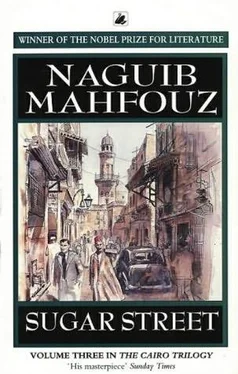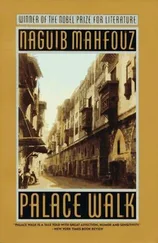Abd al-Muni'm asked, "Will America just stand by and watch?"
"Russia holds the true key to the situation."
"But she's allied with Hitler."
"Communism is the enemy of the Nazis, and the evil threatening the world from a German victory is greater than that from a victory by the democracies."
"They have darkened the world," Khadija complained. "May God darken their lives. What are all these things we never knew before? Air-raid sirens! Anti-aircraft guns! Searchlights! These calamities could turn a man's hair white before his time."
With mild sarcasm, Ibrahim retorted, "At any rate, in our family nobody goes gray prematurely."
"That's only true of you."
Ibrahim was sixty-five now, but compared to al-Sayyid Ahmad, who was only three years his senior, he seemed decades younger.
When the visit was ending, Ridwan instructed Abd al-Muni'm: "Come see me at the ministry."
Once the door was closed behind the departing guests, Ahmad told Abd al-Muni'm, "Be careful not to barge in on him unannounced. Find out how to behave when visiting a minister's secretary."
His brother did not reply or even look his way.
Ahmad had little trouble finding the villa of his sociology professor, Mr. Forster, in the Cairo suburb of al-Ma'adi. On entering, he realized that he was a bit late and that many of the other students had already arrived for this party, which the professor was giving before he returned to England. Ahmad was welcomed by the host and his wife, and the professor introduced Ahmad to her as one of the best students in the department. Then the young man joined the others, who were sitting on the veranda. All levels of the sociology program were represented. As one of the small group promoted to the final year, Ahmad shared with those peers a sense of excellence and of achievement. None of the women students had appeared yet, but he was confident that they would come or at least that his "friend" would, since she also lived in al-Ma'adi. Glancing at the garden, he saw a long table set on a grassy lawn, which was bordered on two sides by willow and palm trees. Lined up on the table were teapots, containers of milk, and platters of sweet confections and pastries.
He heard a student ask, "Shall we observe British manners or swoop down on the table like vultures?"
Another replied rather sadly, "Oh, if only 'Lady' Forster weren't present."
It was late afternoon, but the weather was pleasant, June's reputation for sultriness notwithstanding. In no time at all the eagerly awaited flock was at the door. As if by design, the only four women students in the department all came together. Wearing a fitted pure-white dress that seemed one with the rest of her charming person except for her coal-black hair Alawiya Sabri came into view, striding jauntily forward. At that moment Ahmad, whose secret had long since gotten out, felt a teasing foot rub against his to alert him to her presence, as if there were any need for that. He kept his eyes on the women until they found seats on the veranda in a corner that had been vacated for them.
Mr. Forster and his wife appeared, and, pointing to the girls, Mrs. Forster asked, "Would you like to be introduced?"
Thei r response was resounding laughter. Extraordinarily lively although nearly fifty, the professor said, "It would be far better if you'd introduce them to me."
The guests laughed noisily once more, and Mr. Forster continued: "At about this time each year we leave Egypt for a holiday in England, but this year we don't know whether we'll see Egypt again or not___"
His wife interrupted: "We don't even know if we'll manage to see England!"
They realized that she was referring to the danger posed to shipping by submarines, and more than one voice called out, "Crood luck, ma'am."
The host added, "I'll carry away with me beautiful memories of our life at the Faculty of Arts and of this tranquil and lovely area of al-Ma'adi. I'll always remember you fondly, even your tomfoolery."
To be polite, Ahmad replied, "The memory of you will stay with us forever and will continue to develop as our intellects do."
"Thank you". Then, smiling, the professor told his wife, "Ahmad is an academic at heart, even though he has ideas of a kind that often cause trouble in this country."
One of Ahmad's fellow students explained, "That meanshe's a Communist."
The smiling hostess raised her eyebrows, and Mr. Forster commented in a tone that conveyed more than his words themselves, "I'm not the one who said that. Your comrade did". Then, standing up, he announced, "It's time for tea. We mustn't let the moment slip away from us. Later there will be an opportunity for conversation and entertainment."
The tea party was catered by Groppi's, a famous Cairo establishment, and its waiters stood nearby, ready to serve the guests. "Lady" Forster sat between the girls on one side, and the professor was at the center on the other. To explain the seating arrangement, he said, "We would have liked to mix you up more but decided to respect Eastern etiquette. Isn't that right?"
With out any hesitation, one o the male students answered, "This, unfortunately, is what we've noticed, sir."
A sei-vant poured tea and milk, and the feast began. Ahmad observed furtively that Alawiya Sabri was the most proficient of the girls in Western table manners and the most relaxed. She seemed accustomed to social life and as much at ease as if in her own home. Watching her eat pastries was even sweeter than eating them himself. She was his dear friend who reciprocated his friendship without encouraging him to cross its boundaries.
He told himself, "If I don't seize the opportunity that today offers, I may as well give up."
Mrs. Forster raised her voice to advise them, "I hope you won't let the thought of war rationing make you shy about eating the pastries."
A student commented, "It's a lucky break that the authorities haven't restricted tea yet."
Mr. Forster leaned over toward Ahmad, who was sitting to his left, and inquired, "How do you spend your holidays? I mean, what do you read?"
"A lot of economics and a little politics. I write some articles for magazines too."
"I'd advise you to go on for a master's degree when you finish this one."
After chewing what was in his mouth, Ahmad replied, "Perhaps later on, but I'll start out working as a journalist. That's been my plan for years."
"Excellent!"
His dear friend was conversing easily with Mrs. Forster. How quickly she had perfected her English! The roses and other blooms were as saturated with red and their other colors as his heart was with love. In a world that was truly free, love would blossom like a flower. Only in a Communist country could love be a totally natural emotion.
Mr. Forster said, "I'm sad I won't be able to continue my study of Arabic. I would like to read Majnun's poems in praise of Layla without having to rely on one of you."
"It's a pity that you won't be able to study it anymore."
"Unless circumstances permit, later on."
"You may find yourself obliged to learn German," Ahmad reflected. "Wouldn't it be amusing if London were the scene of demonstrations calling for the evacuation of foreign forces and you took part in them? The seductive charm of the English can be attributed to their manners, but that of my dear friend is unique.
The sun will soon set, and night will find us together in an isolated spot for the first time. If I don't seize this opportunity, I may as well give up."
He asked his professor, "What will you be doing once you return to London?"
"I've been invited to work in broadcasting."
"Then we won't be deprived of hearing your voice."
"A polite statement," Ahmad told himself, "is excusable at a party ornamented by my friend, but we only listen to the German broadcasts. Our people love the Germans, if only because they hate the English. Colonialism is the final stage of capitalism. The situation created by our professor's party merits some thought. Although we justify it in the spirit of intellectual inquiry, there is a conflict between our love for this professor and our loathing for his nationality. Hopefully the war will polish off both the Nazi movement and colonialism. Then I can concentrate entirely on love."
Читать дальше












